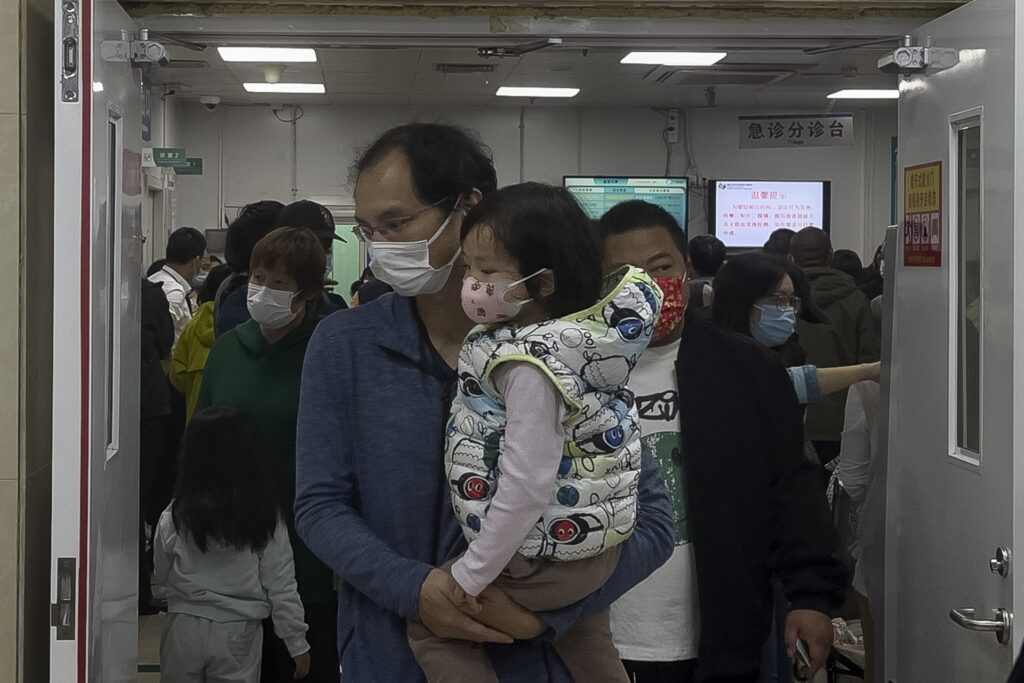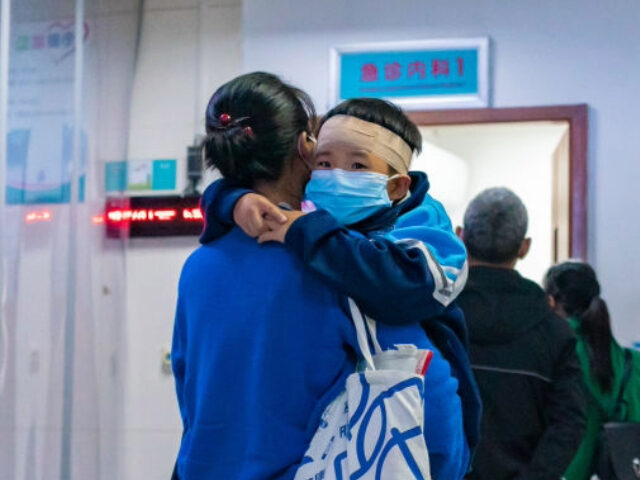Australian health authorities warned on Tuesday they are documenting an increase in the number of diagnosed infections of mycoplasma pneumoniae, a bacterial infection that causes respiratory illness and was listed among several pathogens particularly affecting children in China in the last months of 2023.
China experienced a surge in respiratory illness – which Communist Party officials attributed to influenza, Wuhan coronavirus, and Respiratory Syncytial Virus (RSV) in addition to mycoplasma pneumoniae – in December that overwhelmed hospitals in major cities and shut down schools. Beijing insisted that the respiratory disease cases were not caused by a novel pathogen and admitted that dictator Xi Jinping’s tyrannical coronavirus lockdown policy potentially created an “immunity gap” in which children, especially those born after the pandemic began, had not been properly exposed to various pathogens and thus susceptible to more severe disease than those whose immune systems were properly acclimated to the outside world.
Chinese officials claimed in mid-December that the number of respiratory illness cases had fallen but warned that mass travel in anticipation of the upcoming Lunar New Year holiday could lead to another outbreak of various diseases.
The spread of mycoplasma pneumoniae in New South Wales, Australia, has also reportedly increased in children and led to more hospitalizations, Australia’s news.com.au reported on Tuesday.
“What we are seeing is more cases that are ending up in hospital,” Michael Bonning, the president of the NSW’s branch of the Australian Medical Association (AMA), told the outlet. “The main thing for parents is if a child isn’t reacting in the normal way to a respiratory illness, if kids are not getting back up after a few days we want those kids to be seen by a GP [general practitioner].”

File/A man carriers a child walk out from a crowded holding room of a children’s hospital in Beijing on Oct. 30, 2023. A surge in respiratory illnesses across China that has drawn the attention of the World Health Organization is caused by the flu and other known pathogens and not by a novel virus, the country’s health ministry said Sunday, Nov. 26, 2023. (AP Photo/Andy Wong)
Bonner told the outlet that children between the ages of three and seven are at the highest risk for several mycoplasma pneumoniae infections. He also described the surge in cases in Australia as consistent “with the experience of Asia, North America, and Europe.” Unlike those areas, however, Australia is in the Southern Hemisphere, meaning the increase in respiratory disease is occurring during the summer. Winter weather often accompanies an increase in the spread of respiratory diseases as people spent more time in indoor environments with less air ventilation.
The raw number of mycoplasma cases documented in New South Wales remains low. According to Australia’s ABC News, the state’s emergency rooms recorded four cases for the week ending on January 1. That statistic is quadruple the number documented in the same time period year-on-year since 2019, however, prompting public health officials to raise awareness of the bacterial infection.
“This is a new outbreak that we haven’t really seen previously, and we want to try and make sure that GPs but also parents are aware that we might need to do some additional testing, particularly if they’ve had a persistent cough ongoing for several weeks,” Rebekah Hoffman, chair of the NSW and ACT branch of the Royal Australian College of General Practitioners, told ABC News.
NSW Health, the state government public health entity, issued a separate statement warning of a global “increase in cases of Mycoplasman pneumoniae circulation.”
“While the majority of childhood pneumonias are caused by a variety of viruses and bacterial infections, the proportion of presentations and admissions due to mycoplasma pneumonia and atypical pneumonia is starting to increase,” the statement read.
Like NSW, the Australian state of Queensland documented an “unseasonal” increase in respiratory disease beginning in late December, largely fueled by influenza and Wuhan coronavirus. The chief health officer of the state, John Gerrard, revealed that 300 people were hospitalized with coronavirus infections at the time on December 21, “four times higher than in mid-October,” according to ABC. Gerrard also warned that mycoplasma pneumoniae was becoming more prominent among children in the state.
“Young children may never have been exposed to mycoplasma before. That’s why significant numbers of children are getting sick at the moment because they’re not likely to have any form of natural immunity to the organism,” the doctor was quoted as saying at the time.
“The normal transmission of pathogens — viruses and bacteria — was disrupted and probably immunity in the general population against these organisms has waned a little bit because we’re not regularly exposed to them,” Gerrard said.
Australia experienced some of the world’s most onerous coronavirus civil rights violations during the first two years of the Wuhan coronavirus pandemic. In March 2020, the government announced it would deploy the military to enforce the imprisonment of travelers in quarantine facilities to prevent the spread of the virus. Then-Prime Minister Scott Morrison also enforced door-to-door coronavirus testing in some regions of the country to ensure the government did not fail to document any cases, no matter how mild.
Some Australians imprisoned in quarantine facilities described police and health officials treating them poorly. In at least one case, a woman set fire to her quarantine hotel room.
Those not subject to quarantine facilities endured extended lockdowns.
“The prevalence of respiratory illnesses this winter seems more noticeable than previous years,” respiratory disease expert Wang Guangfa told the Chinese state newspaper Global Times, “one of the key reasons being the rise of an ‘immunity gap’ resulting from decreased antibodies against these pathogens among the general public due to the protective precautions taken in the past three years.”

COMMENTS
Please let us know if you're having issues with commenting.